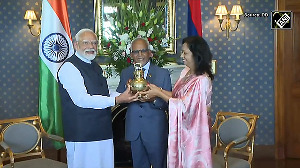 Over 2,000 people, including survivors and a mass of long-time supporters from 10 countries, participated in a massive rally and burnt effigies of Union Carbide and Dow Chemical.
Over 2,000 people, including survivors and a mass of long-time supporters from 10 countries, participated in a massive rally and burnt effigies of Union Carbide and Dow Chemical.
Shouting slogans like '20 years is too long; Justice in Bhopal now', survivors and their supporters rededicated themselves to fight Dow Chemical until justice is done. Saturday's activities marked the 3rd of four days of events commemorating the 20th anniversary of the world's worst industrial disaster.
Organisations formed by survivor are particularly incensed by Union Carbide and Dow Chemical's continued deception on the matter of the former's pending liabilities in Bhopal. "Dow Chemical is hiring top PR companies to propagate the specious sabotage theory hoping to evade liability for Union Carbide's crimes in Bhopal, but if their story were true, they wouldn't need such expensive storytellers," said Shahid Noor of Bhopal ki Aawaaz (Voice of Bhopal).
Noor is one of several children orphaned by the disaster. Union Carbide is facing criminal charges of 'culpable homicide' in a Bhopal court for its role in the 1984 disaster. The company has been declared an absconder for its failure to honour summons issued by the court.
The court is expected to rule on December 6 on whether to summon Carbide to court, through it's owner, Dow.
"The survivors are resolute, their struggle has only become stronger in the past two decades. As activists around the world have identified with the survivors of Bhopal, the struggle for corporate accountability has reached Dow's doorstep in Midland, Michigan," says Gary Cohen, a director of Boston-based Environmental Health Fund.
Indeed, in a repeat of the Vietnam era protests against Dow Chemical for supplying war chemicals to the US military, students on 60 campuses across five continents are participating in the fight to make Dow Chemical address the pending issues in Bhopal.
Survivors and their supporters are demanding that Dow Chemical produce Union Carbide in India to face criminal trial, clean up toxic wastes and contaminated groundwater near the factory site, release medical information about the toxic gases that leaked in 1984, and pay for long-term medical monitoring, health care and economic rehabilitation of survivors and their children.
"We will reserve the bulk of our energy in the coming years for Dow," said Rashida Bee, leader of the Bhopal Gas Affected Women Stationery Workers Association and co-winner of the 2004 Goldman Prize for the Environment.
"Our victories this year are an indication of our strength. We've forced the Indian government to support our claims in a New York court for a clean-up by Carbide and we've won the fight for distribution of the balance of compensation and for supply of clean water," said Syed M Irfan of the Bhopal Gas Peedit Mahila Purush Sangarsh Samiti (Bhopal Gas Affected People's Committee).
Rachna Dhingra of Bhopal Group for Information and Action expressed satisfaction at the setting up of the Local Area Environmental Committee for implementation of the May 7 order of the Supreme Court regarding supplying safe water to the communities adjacent to the factory.
"But we are still fighting for implementation of our demand for a national commission on Bhopal, which would have the resources and authority to carry out long-term rehabilitation work for the survivors and their children," she reiterated.





 © 2025
© 2025